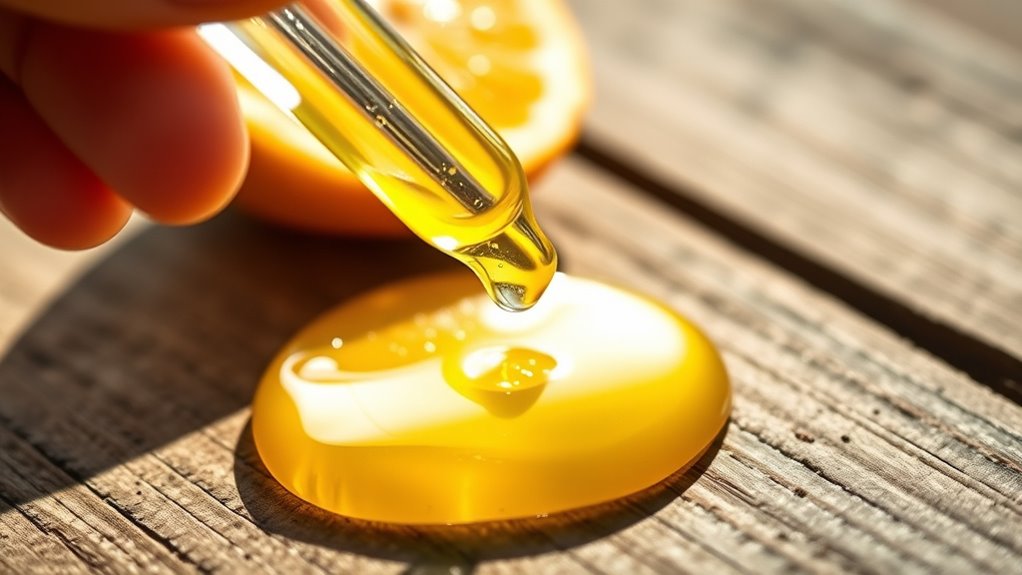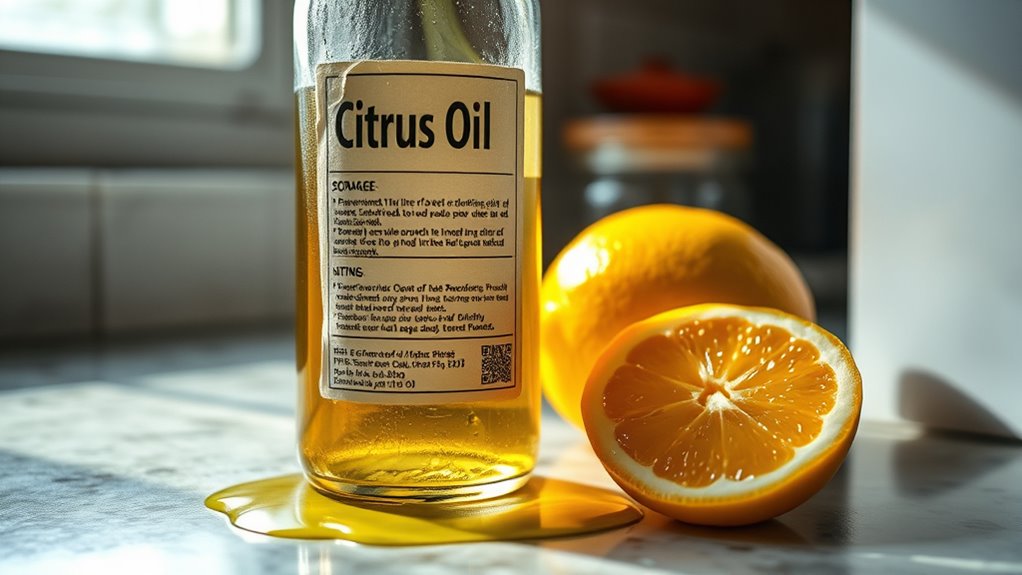To avoid issues with citrus oil photosensitivity, always dilute the oils properly before use, and never apply them right before sun exposure. Perform a patch test to check for reactions, and avoid using on broken or sensitive skin. Store your oils in a cool, dark place to prevent leaks and degradation. Remember, the effects can last hours or days, so taking precautions is key. Keep going to learn more about protecting your skin effectively.
Key Takeaways
- Perform a patch test and wait 24 hours before full application to check for skin reactions.
- Avoid applying citrus oils immediately before sun exposure; wait several hours or use at night.
- Properly dilute citrus oils to reduce skin sensitivity and irritation risks.
- Store oils in cool, dark places with sealed containers to prevent leaks and degradation.
- Always use sun protection, like sunscreen and protective clothing, after applying citrus oils outdoors.
Forgetting to Dilute Citrus Oils Properly

If you forget to dilute citrus oils properly, you risk increasing your skin’s sensitivity to sunlight. Proper dilution is essential to prevent irritation and photosensitivity. Always follow recommended guidelines to ensure you’re using the right amount of carrier oil with citrus essential oils. Neglecting this step can lead to adverse reactions, especially when exposed to UV rays. Additionally, safe storage of citrus oils helps maintain their potency and prevents accidental misuse, which could lead to skin issues. Keep your citrus oils in a cool, dark place and clearly labeled containers to avoid confusion. Understanding the sound vibrations involved in sound healing practices can also enhance your awareness of how external factors influence your skin’s response. By paying attention to proper dilution and safe storage, you reduce the risk of photosensitivity and enjoy the benefits of citrus oils safely. Remember, responsible handling is key to avoiding photosensitive reactions.
Applying Citrus Oils Immediately Before Sun Exposure

Applying citrus oils right before sun exposure can markedly increase your risk of photosensitivity and skin irritation. When you apply citrus oils immediately before heading outside, you give your skin less time to absorb and process the oils safely. This can lead to heightened sensitivity to UV rays, making sun protection more difficult and increasing the chance of burns or damage. Citrus oils contain compounds that, when directly exposed to sunlight, can intensify UV effects on your skin. To reduce this risk, avoid applying citrus oils right before sun exposure. Instead, wait several hours or apply them at night. Proper timing guarantees your skin has a chance to metabolize the oils, decreasing the likelihood of adverse reactions and helping you maintain effective sun protection.
Overlooking the Duration of Photosensitivity Effects

Many people forget that photosensitivity effects from citrus oils can last hours or even days. Ignoring the timing of these effects increases your risk of sun damage after exposure. It’s important to understand how long the effects may persist and take appropriate post-exposure precautions. Regular use of skincare products containing glycolic acid can also improve skin resilience, potentially reducing sensitivity issues. Skin resilience
Timing of Photosensitivity
Understanding how long citrus oil-induced photosensitivity lasts is crucial for effective sun safety. If you underestimate this duration, you might expose yourself to harmful sun exposure when your skin remains sensitive. Accurate timing ensures you avoid unnecessary risks and protect your skin properly. Keep in mind that photosensitivity effects can persist for hours or even days after applying citrus oils, depending on factors like skin type and environmental conditions. Monitoring the timing of your sun exposure allows you to plan outdoor activities accordingly, minimizing the chance of adverse reactions. Remember, precise timing helps you stay ahead of potential skin damage, ensuring you get the benefits of citrus oils without risking photosensitivity-related harm. Additionally, awareness of AI vulnerabilities can inform better safety practices when using photosensitive products. Prioritize timing accuracy for safer, sun-smart practices.
Duration Variability
Since the duration of citrus oil-induced photosensitivity can vary greatly among individuals, it’s easy to underestimate how long your skin remains vulnerable. The duration effects of photosensitivity depend on factors like skin type, the specific citrus oil used, and exposure levels. Some people might experience heightened photosensitivity for just a few hours, while others could be affected for several days. Understanding photosensitivity timing is vital, as it impacts how long you should avoid sun exposure after applying citrus oils. Failing to recognize this variability can lead to unexpected skin damage. Always monitor your skin and remember that duration effects aren’t uniform. Photosensitivity duration varies depending on individual factors and exposure, making it essential to stay vigilant. Being aware of these differences helps you better protect yourself and prevents accidental sunburns during the photosensitivity window.
Post-Exposure Precautions
Failing to contemplate how long citrus oil-induced photosensitivity lasts can lead to unexpected skin damage after sun exposure. Once you’ve been in the sun, it’s essential to monitor your skin closely. Protect it by avoiding additional sun exposure, especially during peak hours, until the photosensitivity subsides. Keep your skin well-hydrated with gentle, fragrance-free moisturizers to support healing and maintain barrier function. If you notice redness, irritation, or burning, take extra precautions and limit further sun contact. Drinking plenty of water helps sustain skin hydration from within. Remember, photosensitivity effects can persist for hours or even days after application, so staying vigilant ensures you prevent long-term damage and keep your skin healthy. Additionally, understanding photosensitivity duration can help you better plan your sun exposure and recovery time.
Using Citrus Oils on Broken or Sensitive Skin

If you have broken or sensitive skin, applying citrus oils can increase irritation and photosensitivity. It’s important to understand your skin’s barrier and use gentle techniques to minimize risks. Always patch-test and wait before applying citrus oils to areas that are compromised.
Skin Barrier Awareness
Using citrus oils on broken or sensitive skin can compromise your skin’s natural barrier, increasing the risk of irritation and photosensitivity. When your barrier weakens, your skin becomes more vulnerable to environmental damage and dehydration. To protect it, focus on these key steps:
- Prioritize hydration essentials by using moisturizers that reinforce your skin’s barrier.
- Seek ingredient transparency to avoid harmful additives that may worsen sensitivity.
- Limit exposure to direct sunlight until your skin heals, reducing photosensitivity risks.
- Be aware that applying citrus oils on damaged skin can lead to increased photosensitivity, making your skin more susceptible to UV damage.
Gentle Application Tips
When applying citrus oils on broken or sensitive skin, gentle techniques can make a significant difference in preventing further irritation. Always use proper dilution techniques to minimize skin stress; dilute citrus oils with a carrier oil before application. This reduces the risk of irritation and enhances safety. Pay attention to application timing—apply citrus oils during times when your skin can recover, avoiding direct sunlight immediately afterward. It’s best to wait at least 12 hours after applying, especially if your skin is compromised. Use soft, patting motions instead of rubbing, and avoid applying citrus oils on open wounds or freshly irritated areas. Additionally, selecting the right application methods can help optimize safety and effectiveness. Following these tips helps protect your skin’s health while still enjoying the benefits of citrus oils safely.
Not Performing a Patch Test Before Full Application

Skipping a patch test before applying citrus oil products can lead to unexpected skin reactions. To avoid this, always perform an allergy testing first. Here’s how:
Always perform a patch test before using citrus oils to prevent skin reactions.
- Apply a small amount of diluted citrus oil on your inner arm and wait 24 hours to check for irritation or redness.
- If no reaction occurs, proceed with caution, remembering that photosensitivity may develop when exposed to sunlight.
- Always include sun protection after application to reduce the risk of photosensitive reactions.
- Since effectiveness of eye patches can vary based on individual skin conditions, it’s especially important to test new products carefully.
Neglecting to Store Citrus Oils Safely

Neglecting to store citrus oils safely can lead to accidental spills, degradation of the oil’s potency, and potential skin irritation. Proper storage safety is essential to prevent leaks that could cause skin contact or damage surfaces. Always keep citrus oils in a cool, dark place, away from direct sunlight and heat, which can accelerate degradation. Additionally, label awareness helps you avoid accidental misuse; ensure bottles are clearly marked and tightly sealed. Use original containers whenever possible to maintain proper labeling and prevent confusion. Storing citrus oils properly not only preserves their effectiveness but also reduces the risk of skin irritation caused by accidental exposure. Remember that understanding dog behavior and companionship can help pet owners create a safer environment for both their pets and their essential oils. Taking these precautions helps you enjoy the benefits of citrus oils safely and responsibly.
Frequently Asked Questions
Can Citrus Oil Photosensitivity Last More Than 24 Hours?
Yes, citrus oil photosensitivity can last more than 24 hours. If you have sun exposure after applying citrus oil, you might experience delayed skin reactions, such as redness or irritation, even days later. To prevent this, avoid direct sunlight and protective clothing for at least 24 hours. Keep in mind that the duration varies depending on skin type and exposure, so stay cautious to protect your skin from potential damage.
Are Certain Citrus Oils More Likely to Cause Photosensitivity?
Certain citrus oil types, like bergamot, lemon, and lime, are more likely to cause photosensitivity risk. When you use these oils on your skin, especially before sun exposure, you increase your chance of a reaction. To protect yourself, avoid applying citrus oils directly to your skin before going outdoors. Always dilute citrus oils properly and do a patch test to minimize photosensitivity issues.
Does Photosensitivity Vary Between Different Skin Types?
Did you know that individuals with fair skin are twice as likely to experience photosensitivity risk compared to those with darker skin tones? Your skin type plays a crucial role in how your skin reacts to citrus oils. If you have sensitive or lighter skin, you’re more prone to photosensitivity, so it’s vital to take extra precautions. Regardless of your skin type, always dilute citrus oils and avoid sun exposure after application to minimize risks.
Can Photosensitivity Reactions Occur Even With Low Citrus Oil Concentrations?
Yes, photosensitivity reactions can occur even with low citrus oil concentrations. Your skin sensitivity plays a role, and some individuals may react at concentration thresholds lower than others. Always test a small amount first, especially if you’re prone to skin sensitivity. Even minimal citrus oil exposure combined with sun exposure can trigger reactions, so it’s best to be cautious regardless of the concentration used.
How Can I Tell if I Have a Photosensitivity Reaction?
You can tell if you have a photosensitivity reaction if your skin develops a rash or experiences itching sensations after exposure to citrus oil and sunlight. You might notice redness, swelling, or a burning feeling on the affected area. Pay attention to these symptoms, especially if they appear within hours of sun exposure. If you suspect a reaction, wash the area and avoid further sun exposure, then consult a healthcare professional.
Conclusion
To stay safe with citrus oils, remember to dilute properly, apply wisely, and store carefully. Always patch test before full use, avoid sun exposure immediately after application, and be mindful of your skin’s sensitivity and condition. By taking these precautions, you protect your skin, prevent photosensitivity, and enjoy the benefits of citrus oils without the risks. Stay informed, stay cautious, and keep your skin healthy and radiant.









